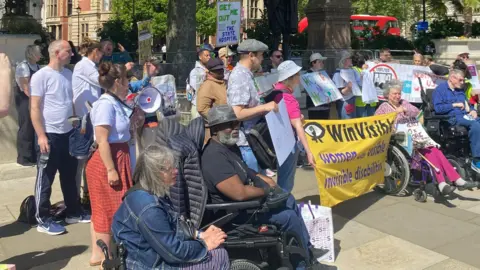Mental health law 'won't stop detentions'
 Getty Images
Getty ImagesCampaigners are warning that a new mental health law covering Wales will not reduce the "unnecessary" detention of disabled people in secure hospitals.
Health is the responsibility of the Senedd but the Welsh government is relying on a Westminster bill to improve how people with learning disabilities and autism are supported during a crisis.
Welsh disability rights campaigners were among those who staged a protest in Westminster against what they say are significant shortcomings in UK Labour's Mental Health Bill.
The UK government said the proposed law "will ensure people get the support they need in the community".
An independent review in 2018 found that "too often" the "outdated system" was being used to detain disabled and autistic people for lengthy periods, often due to a lack of community support.
The UK government wants to change the law so that disabled and autistic people cannot be detained under the act in most circumstances, unless they have a co-occurring mental health disorder.
It said the numbers were "unacceptable" but insisted that the reforms it was proposing would ensure that more people are treated in the community.
Campaigners say the proposals will only have a limited impact on the numbers being detained, unless additional support is also provided in the community.
Dawn Cavanagh, from Hook, Pembrokeshire, founder of the Stolen Lives campaign, told BBC Wales that she believed people would still be detained via other laws including the Mental Capacity Act.
She added: "People with learning disabilities often end up in hospitals because there's a breakdown in housing and community care and it's the only place they can go.
"So, if that community care isn't there, there is nowhere for them to go and they'll still be detained."

Her concerns were echoed by Sophie Hinksman, a 39-year-old woman with fetal alcohol syndrome who was sectioned in 2016 after her mental health declined.
She said she will "probably never get over" the trauma of being detained, which she believes could have been avoided if she'd been given more effective help in the community.
Ms Hinksman, from Pembrokeshire, said: "If I'd got the right support at home and somebody to... reassure me everything should have been okay."
The Welsh government said that 135 people with a learning disability are being treated in specialised inpatient services in Wales but it disagrees people are "systematically detained inappropriately".
In England, NHS figures show over 2,000 people with learning disabilities or autism are being held as hospital inpatients, and about half of them have been detained for over 2 years, which the UK government said was "unacceptable".
Disability rights groups, including People First Wales, have also accused UK ministers of refusing to meet with them to discuss concerns about the bill.
People First Wales chief executive, Joe Powell, said: "There are too many policies being written and implemented by people who don't really understand what they mean to the people who need them."
Welsh government sources previously said they were adopting the UK's Mental Health Bill to avoid a "fragmented approach", with different policies in Wales and England.
But earlier this month, the Senedd's legislation, justice and constitution committee said this had the effect of "sidelining the Senedd" and limiting the Welsh Parliament's scrutiny of the bill.
'Unacceptable'
A Department of Health and Social Care spokesperson said: "The number of autistic people and people with a learning disability in mental health hospitals is unacceptable.
"Through our proposed reforms to the Mental Health Act, we will ensure people get the support they need in the community, closer to home, improving care and keeping people out of hospitals.
"We welcome stakeholders' contributions, including through the public consultation, and will engage further as the bill progresses through Parliament."
A Welsh government spokesperson said: "We take the care of vulnerable people very seriously and are committed to reducing the number of people with a learning disability who are housed in hospital.
"We do not agree that people with learning disabilities are being systematically detained inappropriately in mental health units. When this does happen, it is vitally important they receive appropriate care, which includes a care plan that is reviewed regularly and options around future accommodation are fully considered.
"Health boards and local authorities continue to work to ensure suitable accommodation is provided in communities to facilitate step-down provision for those leaving inpatient accommodation."
